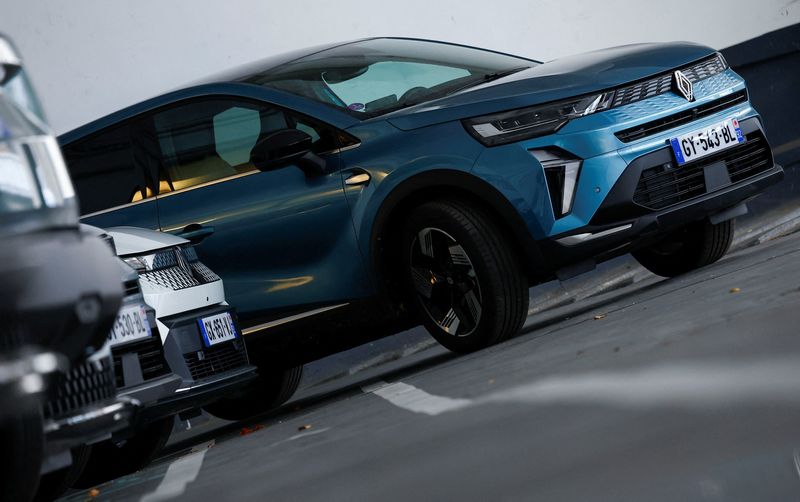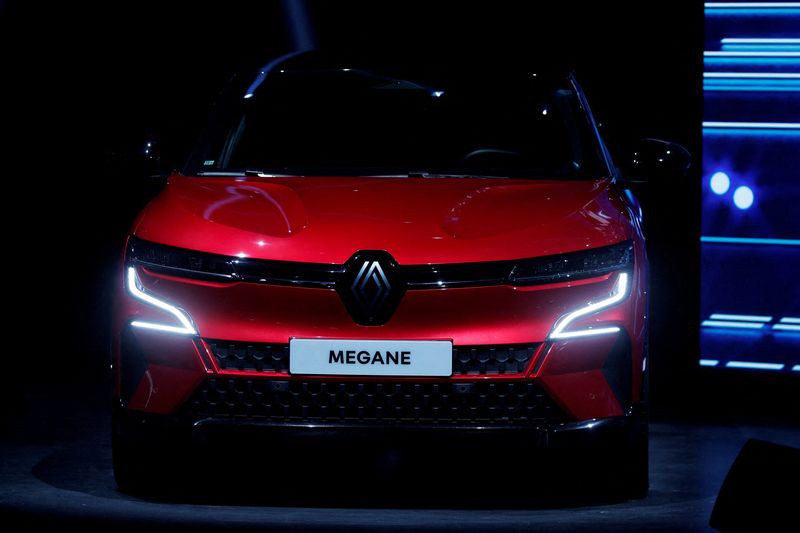By Gilles Guillaume
PARIS (Reuters) - Renault (EPA:RENA) CEO Luca de Meo's bet on a low-cost gearbox technology is allowing the French carmaker to gain ground in Europe's fast-growing hybrid car market, giving it some breathing space as rivals get squeezed by the electric mobility challenge.
Demand for expensive electric vehicles is not taking off in Europe despite a European Union ban on combustion engine cars due to come into force in 2035, putting massive strain on Europe's automotive industry.
But Renault, which is smaller than auto peers and was hit by record losses in 2020, is showing surprising strength in hybrid cars that use both a thermal engine and an electric one.
In the first eight months of the year, sales of Renault hybrid models including the Clio and Captur were up 55% from the previous year, according to Renault preliminary figures, above a 21.1% increase for the whole of the European Union, data from European industry body ACEA show.
The sales increase, which reached 60% in the first half of the year, made the Renault brand Europe's second-biggest in this segment, behind Japan's Toyota (NYSE:TM).
"Renault seems to be doing very, very well," analysts at Stifel said after the carmaker announced on Oct. 8 it was sticking to its business targets, one of the few traditional carmakers not to revise downwards its estimates amid tough market conditions.
"We think the company is simply more versatile and agile than its peers," they added in a research note.
Retaining strength in hybrid cars, cheaper than electric vehicles but less polluting than traditional ones, could help de Meo to lower the group's overall emissions and grow sales in the near term.
Demand for hybrids is expected to continue to grow until the end of this decade, before electric vehicles take over, according to consultancies Dataforce and S&P Global.
With a market cap of 11.6 billion euros ($12.68 billion), Renault is worth just a quarter of European leader Volkswagen (ETR:VOWG_p), which makes it more nimble but potentially more vulnerable than peers against intensifying competition from Chinese e-cars.
The company, 15%-owned by the French state, is also seeking a new direction after having largely abandoned its two-decades long alliance with Nissan (OTC:NSANY) and Mitsubishi, and after ditching a planned IPO of EV arm Ampere.
LOW-COST GEARBOX
The secret behind Renault's recent success in hybrid is a focus on a technology that the French group has mastered.
A pioneer in gearboxes a century ago, Renault engineers turned to a simplified 'dog clutch' - used to connect and disconnect gears without the need for a battery of syncronisers - to create a low-cost hybrid transmission system, named E-Tech.
A gear box uses syncronisers and gears to manage the speed of the engine and its transmission to wheels.
The E-tech system, which can be used across all of Renault's models, requires fewer components than other dual engines, making it lighter and cheaper.
Investors appear to be happy. Renault shares are up 6.4% this year, versus a 12% decline for the European auto share index.
"Renault is particularly at ease in balancing between battery electric vehicles and hybrid transmissions compared with its competitors," said Philippe Houchois, analyst at Jefferies.
Growth should continue as Renault introduces more new models at affordable prices, say analysts. Renault's hybrid Clio is 400 euros more expensive than the Toyota Yaris and the Peugeot (OTC:PUGOY) 208, but more powerful and its E-tech gearbox system can be used in small cars as well as in its new 300 horsepower Rafale coupé sedan.
"Renault is going to keep this advantage for several years," said Antoine Giraud, S&P Global analyst.
STAGNANT EVS
The strength in hybrids, which are less harmful for the environment than regular cars, will help Renault comply with EU rules to limit CO2 emissions rules even as it sells fewer electric vehicles than competitors, said Benjamin Kibies, senior automotive analyst at Germany-based consultancy Dataforce.
Renault's E-Tech hybrid cars emit as little as 95 grams per kilometre, which helped the group to reach a CO2 average of 114 grams in the first six months of 2024, says Dataforce.
That's better than Ford (NYSE:F) and Volkswagen's average CO2 emissions of 123 grams and 125 grams respectively.
But Renault's surprising strength in hybrids will only go so far. Carmakers in Europe must reduce average CO2 emissions to 94 grams per kilometre from next year.
To comply with such limits, Renault will need just under 20% of its sales to come from electric cars, said a source familiar with the matter, who declined to be named because of confidentiality issues. That's hard while Renault's EV sales remain stagnant at around 12% of its brand sales in Europe.
An early mover in electric vehicles in the last decade, Renault has been overtaken by pure players like Tesla (NASDAQ:TSLA), and larger competitors like Stellantis (NYSE:STLA) .
De Meo will unveil a new electric SUV, the Renault 4, at the Paris autoshow that starts on Oct. 14, following the recent launch of the Renault 5, another small EV.

"Selling more hybrids instead of thermal vehicles can only go in the right direction. But the key will also be the success of the launches of both the R5 and R4," said Giraud.
($1 = 0.9145 euros)
